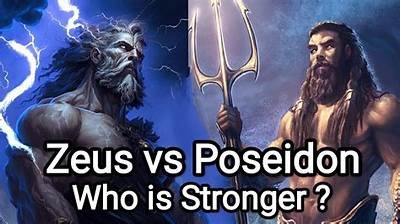The ancient Greek pantheon is filled with powerful deities, each possessing unique attributes and strengths. Among them, Zeus, the king of the gods, and Hades, the ruler of the underworld, stand out as titans of immense power. Their domains and personalities differ vastly, fueling debates about who would emerge victorious in a battle between them. This article delves into their backgrounds, powers, and potential strategies, ultimately offering insights into this legendary clash.

Zeus, known as the god of the sky and thunder, is perhaps the most well-known deity in Greek mythology. Born to Cronus and Rhea, he rose to power by overthrowing his father and establishing dominion over Mount Olympus. Zeus is often depicted wielding a thunderbolt, a symbol of his authority and might. His personality is characterized by strength, authority, and occasionally, unpredictability. As the protector of both gods and mortals, he is deeply involved in human affairs, often intervening in wars, disputes, and personal matters.

In stark contrast, Hades represents the unseen depth of the cosmos. As the god of the underworld and the dead, he rules from his gloomy domain, ensuring the souls of the deceased reach their rightful place. Unlike his brother Zeus, Hades is often misunderstood; he embodies neither pure evil nor malevolence. He is dedicated to maintaining balance and order in the afterlife. Hades is similarly powerful, possessing a helmet of invisibility and commanding legions of shades. His domain is vital for the continuity of existence, and he approaches his responsibilities with a sense of duty rather than ambition.

Zeus's powers are extensive, anchored in his ability to manipulate weather and wield lightning with deadly accuracy. His authority extends over the Olympian gods, legitimizing his reign through both might and diplomacy. Besides shaping the natural world, Zeus can also exert control over fate, although this is more of a nuanced and indirect influence. His strength is amplified in warfare; he is known to enhance the capabilities of his allies while incapacitating foes using his thunderbolts.

Hades’s powers are deeply rooted in life and death. He can manipulate the souls of the dead, ensuring that they remain in the underworld. His helmet grants him invisibility, making him a deceptive and formidable force in battle. Hades also holds dominion over various mythical creatures, including Cerberus, the three-headed dog who guards the entrance to the underworld. This control over the dead can be a double-edged sword; while he can unleash them, he often prefers to maintain order within his domain.

A battle between Zeus and Hades could unfold in various settings, each influencing their strategies and outcomes. If the clash were to occur in the skies of Olympus, Zeus would have the clear advantage, using the weather to manipulate and strengthen his strikes. Conversely, if the confrontation took place in the underworld, Hades’s familiarity with the terrain and resources would give him the upper hand, using shadows and the lost souls to mount a surprise attack. Strategies Employed
In a face-to-face confrontation, both brothers would rely on their unique strengths. Zeus would likely utilize his thunderbolts and weather-manipulating abilities to create chaos and disarray. On the other hand, Hades might employ his powers of invisibility and summon minions from the underworld, using guerrilla tactics to outmaneuver Zeus. The key to victory for both would be understanding the other's strengths and weaknesses and exploiting them to the utmost. Psychological Tactics
Besides brute strength, psychological warfare plays a crucial role in any battle. Zeus is known for his authoritative nature, which can intimidate opponents. Hades, with his stoic and often overlooked demeanor, can cause perplexity and draw his opponents into underestimating him. Understanding each other's psychological strengths could turn the tide in this epic showdown. Hades could lure Zeus into traps by exploiting his emotions tied to mortals, while Zeus could use his charm to influence and manipulate the sentiments of the souls under Hades’s care. The Role of Other Deities
A battle of this magnitude would likely draw the attention of other deities in the pantheon. Deities such as Athena might advocate for a diplomatic resolution, while Ares would thrive in the chaos of battle. The involvement of these other gods could sway the odds significantly, transforming a one-on-one confrontation into a larger conflict that tests alliances and loyalties. Conclusion
Ultimately, determining the victor in a battle between Zeus and Hades hinges on a multitude of factors, including environment, strategy, and psychological tactics. While Zeus has the upper hand in brute strength and divine authority, Hades commands the mysteries of the afterlife and the element of surprise. In a true clash of titans, both could emerge as winners and losers in different aspects, with the battle illustrating the complexities of their characters and realms. The rivalry between these two powerful gods signifies not just a conflict of strength but also the balance of life and death, authority and duty. Tags
 WillBet: Elevate Your Betting Experience
WillBet: Elevate Your Betting Experience
